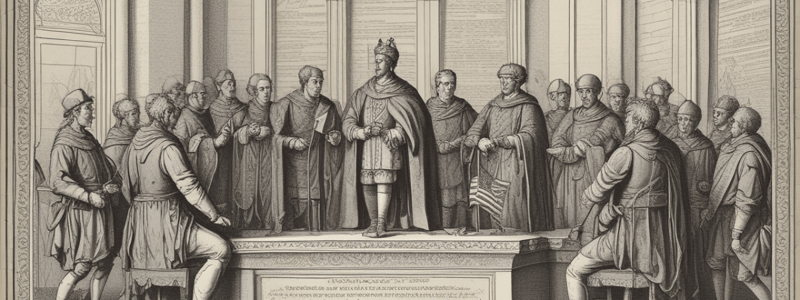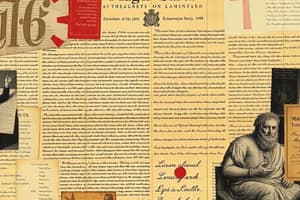Podcast
Questions and Answers
Which clause of the Magna Carta established the principle that individuals have the right to a fair trial?
Which clause of the Magna Carta established the principle that individuals have the right to a fair trial?
- Clause 39 (correct)
- Clause 25
- Clause 61
- Clause 15
What was the main purpose of establishing a council of 25 barons according to the Magna Carta?
What was the main purpose of establishing a council of 25 barons according to the Magna Carta?
- To advise the king on matters of war
- To collect taxes from the nobles
- To govern the country in times of crisis
- To ensure the king's compliance with the charter (correct)
What is the main principle of limited government established by the Magna Carta?
What is the main principle of limited government established by the Magna Carta?
- That the church has the power to govern the country
- That the power of the monarch is not absolute (correct)
- That the nobles have the right to rebel against the king
- That the king has absolute power
Which amendment of the US Constitution was directly influenced by the Magna Carta's Clause 39?
Which amendment of the US Constitution was directly influenced by the Magna Carta's Clause 39?
What is the significance of the Magna Carta in modern constitutional law?
What is the significance of the Magna Carta in modern constitutional law?
What does the phrase 'law of the land' refer to in Clause 39 of the Magna Carta?
What does the phrase 'law of the land' refer to in Clause 39 of the Magna Carta?
Why is the Magna Carta considered a cornerstone of modern constitutional law?
Why is the Magna Carta considered a cornerstone of modern constitutional law?
What is the significance of the council of 25 barons in the context of limited government?
What is the significance of the council of 25 barons in the context of limited government?
Which of the following is an example of the influence of the Magna Carta on constitutional law?
Which of the following is an example of the influence of the Magna Carta on constitutional law?
What is the main principle of due process established by the Magna Carta?
What is the main principle of due process established by the Magna Carta?
Flashcards are hidden until you start studying
Study Notes
Due Process
- The Magna Carta introduced the concept of due process, which protects individuals from arbitrary and unjust treatment by the government.
- Clause 39 of the Magna Carta states: "No free man shall be seized or imprisoned, or stripped of his rights or possessions, or outlawed or exiled, nor will we proceed with force against him, except by the lawful judgement of his equals or by the law of the land."
- This clause established the principle that individuals have the right to a fair trial and that the government cannot punish them without following the law.
Limited Government
- The Magna Carta established the principle of limited government, which means that the power of the monarch (or government) is not absolute.
- The document limited the king's power by establishing that even he was not above the law.
- Clause 61 of the Magna Carta states: "The barons shall elect twenty-five of their number to keep, and cause to be observed with all their might, the peace and liberties granted and confirmed to them by this charter."
- This clause established a council of 25 barons to ensure the king's compliance with the charter, limiting his power and establishing a system of checks and balances.
Influence on Constitutional Law
- The Magna Carta's influence on constitutional law can be seen in many countries, including the United States.
- The US Constitution's Fifth Amendment, which guarantees due process, was directly influenced by the Magna Carta's Clause 39.
- The US Constitution's system of checks and balances, which limits the power of the government, was also influenced by the Magna Carta's establishment of a council of barons to limit the king's power.
- The Magna Carta's principles of limited government and due process have been incorporated into many other national constitutions, making it a cornerstone of modern constitutional law.
The Magna Carta and Due Process
- Introduced the concept of due process, protecting individuals from arbitrary and unjust government treatment
- Clause 39: no free man shall be seized, imprisoned, or stripped of rights/possessions without lawful judgement of equals or by the law of the land
- Established the principle of fair trial and government accountability to the law
Limited Government
- Established the principle of limited government, restricting the monarch's power
- The king is not above the law, and his power is limited by the charter
- Clause 61: a council of 25 barons ensures the king's compliance with the charter, establishing a system of checks and balances
Influence on Constitutional Law
- Influenced constitutional law in many countries, including the United States
- US Constitution's Fifth Amendment (due process) was directly influenced by Clause 39
- US Constitution's system of checks and balances was influenced by the council of barons
- Principles of limited government and due process have been incorporated into many national constitutions, making it a cornerstone of modern constitutional law
Studying That Suits You
Use AI to generate personalized quizzes and flashcards to suit your learning preferences.




